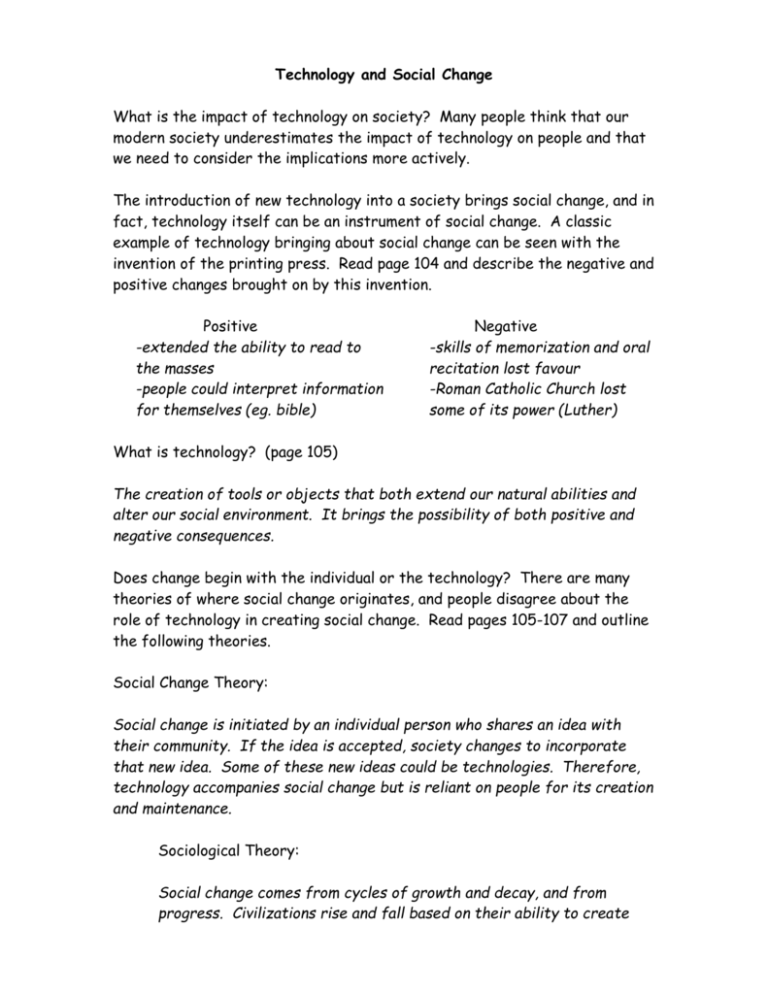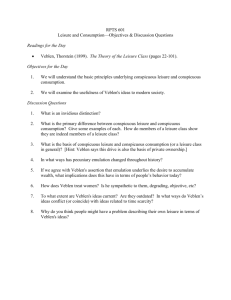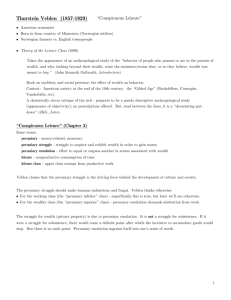Technology and Social Change - BCI
advertisement

Technology and Social Change What is the impact of technology on society? Many people think that our modern society underestimates the impact of technology on people and that we need to consider the implications more actively. The introduction of new technology into a society brings social change, and in fact, technology itself can be an instrument of social change. A classic example of technology bringing about social change can be seen with the invention of the printing press. Read page 104 and describe the negative and positive changes brought on by this invention. Positive -extended the ability to read to the masses -people could interpret information for themselves (eg. bible) Negative -skills of memorization and oral recitation lost favour -Roman Catholic Church lost some of its power (Luther) What is technology? (page 105) The creation of tools or objects that both extend our natural abilities and alter our social environment. It brings the possibility of both positive and negative consequences. Does change begin with the individual or the technology? There are many theories of where social change originates, and people disagree about the role of technology in creating social change. Read pages 105-107 and outline the following theories. Social Change Theory: Social change is initiated by an individual person who shares an idea with their community. If the idea is accepted, society changes to incorporate that new idea. Some of these new ideas could be technologies. Therefore, technology accompanies social change but is reliant on people for its creation and maintenance. Sociological Theory: Social change comes from cycles of growth and decay, and from progress. Civilizations rise and fall based on their ability to create and adapt to new ideas and situations, eg. Roman military technology was instrumental in its rise to power. Technology and ideology is instrumental in social change. Anthropological Theory: Change and adaptation are accompanied by diffusion and acculturation (incorporation, directed change and cultural evolution). Technology is shared through diffusion and acculturation. Societies thrive on stability and equilibrium and technology is a destabilizing factor – brings about change. Psychological Theory: Change is brought about by the change in mental states of individuals. Humans strive for mental stability (cognitive consistency) and for success. Technology arises out of the human need to achieve, for stability and to leave their mark on society. Technological Determinism: Change is not initiated by the individual, but by technology itself. First developed by Thorstein Veblen. See inventions (eg. computer, TV) as taking on a life of their own after being invented and introduced into society. TV – created a new gathering place and method of socializing and socialization for people. TV is the force that modifies people’s behaviour. Conspicuous Consumption: Publicly declaring ones wealth by purchasing luxury items. Done by the leisure class. Pecuniary Emulation: Clearly demonstrating ones material wealth. Veblen believed that the leisure class could damage society because of their desire to make money and remove selves from constructive labour in favour of leisure. Progressive change is technologically grounded and makes economic sense because it increases our efficiency and because it appeals to a large population and erodes the power base of the leisure class.











